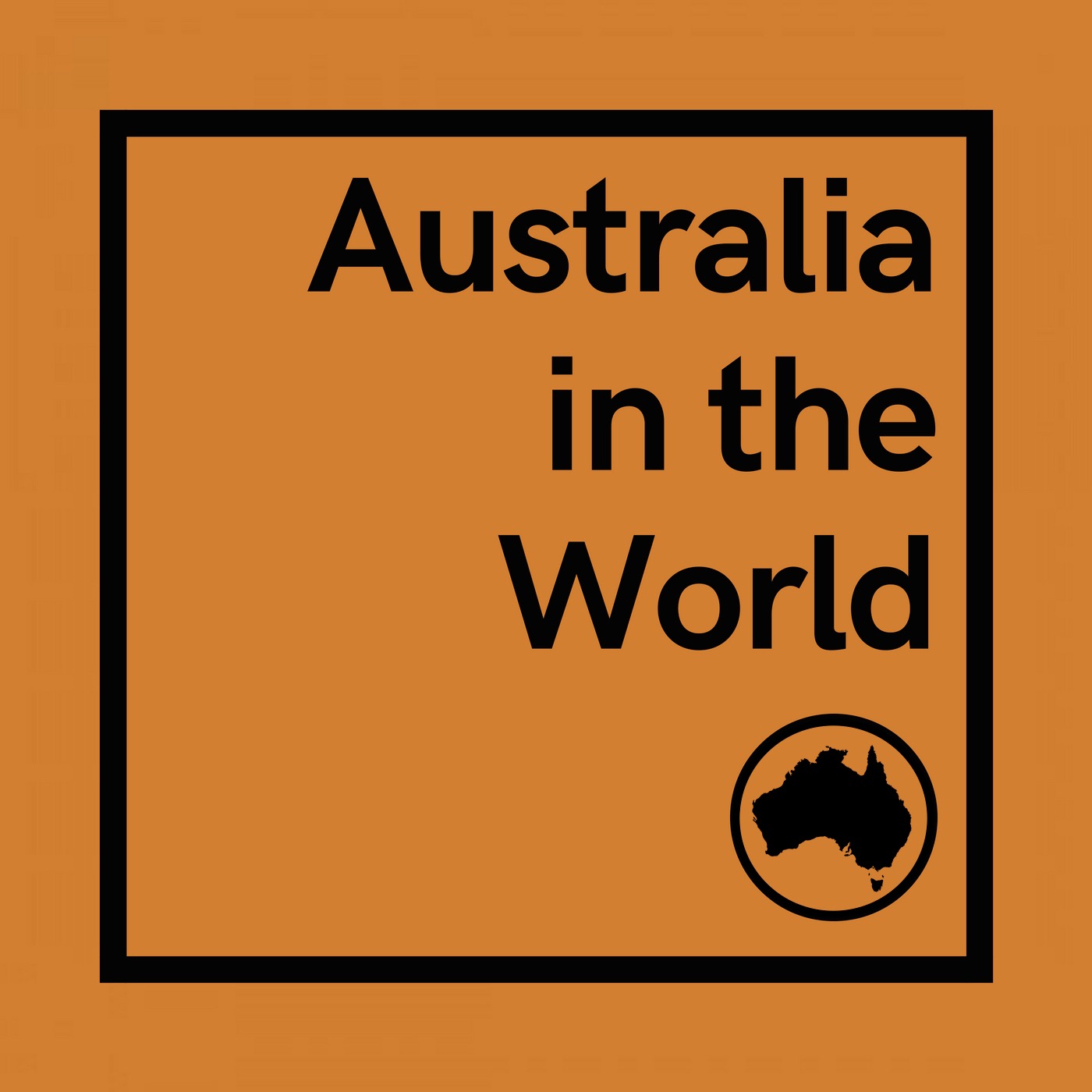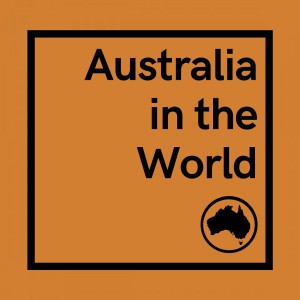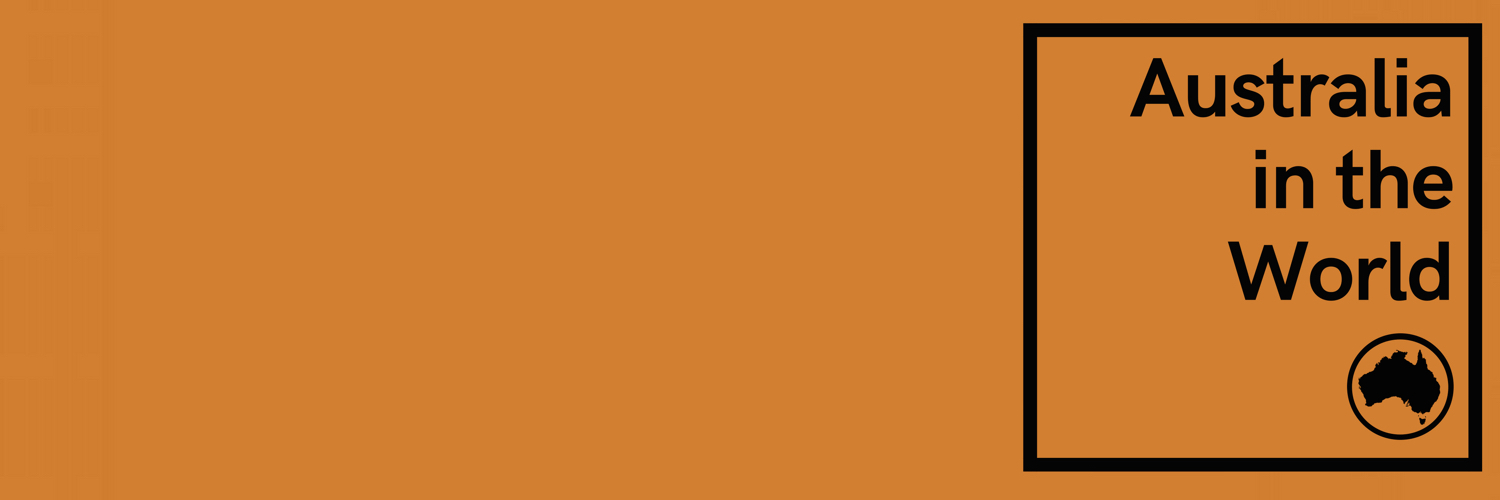
707.5K
Downloads
176
Episodes
A discussion of the most important news and issues in international affairs through a uniquely Australian lens. Hosted by Darren Lim, in memory of Allan Gyngell.
A discussion of the most important news and issues in international affairs through a uniquely Australian lens. Hosted by Darren Lim, in memory of Allan Gyngell.
Episodes

Friday Apr 05, 2024
Ep. 126: The international economic order—Past, present, and future
Friday Apr 05, 2024
Friday Apr 05, 2024
In the second episode in a mini-series on international order, Darren is joined by Dr. Jenny Gordon to discuss the international economic order. Over the past 40 years Australia has arguably been the single greatest beneficiary of the post-war economic order, at least among the group of industrialised countries. But from the GFC to Brexit to paralysis in the WTO to the rise of weaponised interdependence, geoeconomics and industrial policy, the rules and institutions of that old economic order – and the international trade and investment that flourished within it – are all under threat.
Dr Jenny Gordon is an Honorary Professor at POLIS: The Centre for Social Policy Research at the Australian National University and a non-resident fellow at the Lowy Institute. Jenny had a long career in government, most recently as Chief Economist at DFAT from 2019 to 2021. Prior to that she spent 10 years at the Productivity Commission as the Principal Advisor Research, worked in the private sector, and began her professional career at the Reserve Bank of Australia. She holds a PhD in economics from Harvard University.
The conversation begins with the question: what was the old economic order, when did it begin and what did it do? As an economist, Jenny says the end of the Cold War is not a key turning point for the post-war economic order, one must go back to the 1970s and forward to 2000s find these turning points. She describes why the order worked well and how Australia did so well within it. The discussion moves to the problems and tensions that emerged that have led us to the current moment, and the two debate – and disagree slightly – on the actual state of the current economic order. Finally, they look to the future, and discuss industrial policy, climate change, alternative models of economic growth and, of course, geopolitics, as well as what the rules and institutions of the future might need to do to protect the benefits of economic openness while managing contemporary policy challenges like climate change.
Australia in the World is written, hosted, and produced by Darren Lim, with research and editing this episode by Walter Colnaghi and theme music composed by Rory Stenning.
Relevant links
Jenny Gordon (bio): https://www.lowyinstitute.org/jenny-gordon
The Seven Moons of Maali Almeida: https://en.wikipedia.org/wiki/The_Seven_Moons_of_Maali_Almeida
Peter Bellwood, The Five-Million-Year Odyssey: The Human Journey from Ape to Agriculture: https://press.princeton.edu/books/hardcover/9780691197579/the-five-million-year-odyssey
99 Percent Invisible (podcast): https://99percentinvisible.org/
Lupin (Netflix): https://www.netflix.com/au/title/80994082
Huberman Lab Podcast, “Dr. Becky Kennedy: Protocols for Excellent Parenting & Improving Relationships of All Kinds”, 26 February 2024: https://www.hubermanlab.com/episode/dr-becky-kennedy-protocols-for-excellent-parenting-improving-relationships-of-all-kinds

Saturday Mar 23, 2024
Ep. 125: Wang Yi visits Australia
Saturday Mar 23, 2024
Saturday Mar 23, 2024
China's foreign minister, Wang Yi, visited Australia this week. The visit attracted a great deal of scrutiny, not just for the long list of issues in the bilateral relationship, but also Wang's meeting with former Prime Minister Paul Keating. Stephen Dziedzic of the ABC joins Darren to discuss the week's events.
Australia in the World is written, hosted, and produced by Darren Lim, with research and editing this episode by Walter Colnaghi and theme music composed by Rory Stenning.
Relevant links
Stephen Dziedzic, “Tibetan activists protest outside Chinese embassy against Foreign Minister Wang Yi's visit”, ABC News, 20 March 2024: https://www.abc.net.au/news/2024-03-20/apn-protest-outside-chinese-embassy-as-wang-yi-visits/103611798
Daniel Flitton, “Don’t be timid about Trump, Australia, just roll with the punches, Lowy Interpreter, 21 March 2024: https://www.lowyinstitute.org/the-interpreter/don-t-be-timid-about-trump-australia-just-roll-punches

Tuesday Mar 19, 2024
Ep. 124: Ukraine, Gaza, and international order
Tuesday Mar 19, 2024
Tuesday Mar 19, 2024
This episode is the first of a series of at least three that are linked by the theme of international order. Last year US Secretary of State Blinken said “what we’re experiencing now is more than a test of the post-Cold War order. It’s the end of it”. The concept of the possible ending of an order raises lots of questions: what exactly was the old order, why is it ending (if indeed it is), and what might come next? Why do these questions matter for Australia in the world?
This series will try to tackle these questions from a few different angles.
The first topic is war and international order. The two-year anniversary of Russia’s invasion of Ukraine has passed, and it is approaching six months since Hamas attacked Israel. These are conflicts with potentially major impacts on international order. They are also important for the leadership role the US might play in that order going forward.
To discuss these conflicts through the lens of order Darren is joined by Andrew Phillips, an Associate Professor at the University of Queensland. Andrew’s research focuses on war, strategy, and international order, with a particular focus on Great Power rivalry and asymmetric violence as drivers of transformative change in world politics.
Andrew and Darren recorded this episode earlier in March. They start with an assessment of where each of these conflicts is currently at, how they might end, and through what mechanisms they are affecting the broader international order, and the leadership role of the United States. It is one of the longest episodes in the history of the podcast, but the simple fact is that these types of conversations require such length to be done well.
Australia in the World is written, hosted, and produced by Darren Lim, with research and editing this episode by Corbin Duncan and theme music composed by Rory Stenning.
Relevant links
Andrew Phillips (bio): https://polsis.uq.edu.au/profile/1348/andrew-phillips
Darren Lim and G. John Ikenberry, “China and the Logic of Illiberal Hegemony”, Security Studies, 28 February 2023: https://www.tandfonline.com/doi/full/10.1080/09636412.2023.2178963
George Lawson and Ayşe Zarakol, “Recognizing injustice: the ‘hypocrisy charge’ and the future of the liberal international order”, International Affairs, Volume 99, Issue 1, January 2023, Pages 201–217: https://academic.oup.com/ia/article/99/1/201/6967344
Dune (Part 2): https://www.imdb.com/title/tt15239678/
Ezra Klein Show (podcast), “Marilynne Robinson on Biblical Beauty, Human Evil and the Idea of Israel”, 5 March 2024: https://www.nytimes.com/2024/03/05/opinion/ezra-klein-podcast-marilynne-robinson.html

Saturday Mar 09, 2024
Ep. 123: ASEAN in Melbourne
Saturday Mar 09, 2024
Saturday Mar 09, 2024
A frenetic period of Australian diplomacy has wrapped up, after Australia hosted the ASEAN-Australia Special Summit in Melbourne, which commemorated 50 years of Dialogue Relations. The ABC’s Stephen Dziedzic followed events closely and joins Darren to talk through the week’s news.
Australia in the World is written, hosted, and produced by Darren Lim, with research and editing this episode by Walter Colnaghi and theme music composed by Rory Stenning.
Relevant links
Stephen Dziedzic, “Australia and South-East Asian nations endorse watered-down Melbourne Declaration to strengthen ties in the region”, ABC News, 6 March 2024: https://www.abc.net.au/news/2024-03-06/australia-south-east-asia-melbourne-declaration-asean-ties/103556630
Susannah Patton, X (Twitter) Thread with reflections on the ASEAN summit, 7 March 2024: https://twitter.com/SusannahCPatton/status/1765500247349039417
Greg Earl, “Economic diplomacy: Australia Inc’s new tilt at ASEAN”, Lowy Interpreter, 7 March 2024: https://www.lowyinstitute.org/the-interpreter/economic-diplomacy-australia-inc-s-new-tilt-asean

Sunday Feb 25, 2024
Ep. 122: Indonesia, before and after the election
Sunday Feb 25, 2024
Sunday Feb 25, 2024
Indonesians have voted for their next president, and while the results have not been finalised, Prabowo Subianto looks very likely to replace the incumbent Joko Widodo (Jokowi). Darren is joined by Aaron Connelly, Senior Fellow for Southeast Asian Politics and Foreign Policy at the International Institute for Strategic Studies, to discuss politics in Indonesia. In particular, how did Jokowi’s former rival in his two election victories come to receive the president’s implicit support in this one? Who is the typical “swing voter” in Indonesia? How will Jokowi’s legacy be affected by the conduct of the election, and what might we expect from a Prabowo presidency, especially given his controversial past?
Australia in the World is written, hosted, and produced by Darren Lim, with research and editing this episode by Corbin Duncan and theme music composed by Rory Stenning.
Relevant links
Aaron Connelly biography: https://www.iiss.org/en/people/southeast-asian-politics-and-foreign-policy/aaron-connelly/
Pramoedya Ananta Toer, Buru Quartet Series: https://www.penguinrandomhouse.com/series/AN6/buru-quartet/
The National Security Podcast, “Election watch 2024: what makes Indonesian democracy unique?”, 8 February 2024: https://shows.acast.com/the-national-security-podcast/episodes/2024-indonesian-elections
Lowy Institute Conversations, “The comeback general — Prabowo’s thumping victory and what it means for Indonesia”, 16 February 2024: https://www.lowyinstitute.org/publications/conversations-comeback-general-prabowo-s-thumping-victory-what-it-means-indonesia

Sunday Feb 25, 2024
Ep. 120: Where to from ”stabilisation” in Australia-China relations?
Sunday Feb 25, 2024
Sunday Feb 25, 2024
PM Albanese’s visit to Beijing has ended. Are Australia-China relations “stabilised”? And if so, what’s next? To discuss these big questions Darren is joined by Ben Herscovitch, his colleague at the ANU and author of the indispensable Substack newsletter “Beijing to Canberra and Back”.
Relevant links
Ben Herscovitch, “The Prime Minister's visit, what really caused relationship repair, and a policy takeaway”, Beijing to Canberra and Back, 30 October to 7 November 2023: https://beijing2canberra.substack.com/p/the-prime-ministers-visit-what-really
Ben Herscovitch, “Australia should sanction Chinese officials abusing human rights”, Canberra Times, 7 November 2023: https://www.canberratimes.com.au/story/8413517/no-escaping-an-uncomfortable-fact-about-pms-handling-of-china/
Darren Lim and Walter Colnaghi, “Allan Gyngell's podcasting contribution to Australian foreign policy”, Australian Journal of International Affairs, 7 November 2023: https://www.tandfonline.com/doi/full/10.1080/10357718.2023.2272825
Yiruma, “River flows in you” (video): https://www.youtube.com/watch?v=7maJOI3QMu0 N
NASA, "Pale blue dot" (image): https://science.nasa.gov/resource/voyager-1s-pale-blue-dot/
Jurassic Park (Film): https://en.wikipedia.org/wiki/Jurassic_Park_(film)

Sunday Feb 18, 2024
Ep. 121: Reviewing 2023; speculating about 2024
Sunday Feb 18, 2024
Sunday Feb 18, 2024
Continuing a tradition of podcast, for the first episode back from a long summer break Darren is joined by good friend of the podcast Richard Maude to discuss what each learned from 2023, what trends were notable, and what we might expect – or hope for – in 2024. The discussion covers both the world, and Australia in the world, and the two are able to agree on the ‘word of the year’ for 2023: fragmentation.
Australia in the World is written, hosted, and produced by Darren Lim, with research and editing this episode by Walter Colnaghi and theme music composed by Rory Stenning.
Relevant links
Richard Maude biography: https://asiasociety.org/policy-institute/richard-maude
Secretary Antony J. Blinken Remarks to the Johns Hopkins School of Advanced International Studies (SAIS) “The Power and Purpose of American Diplomacy in a New Era”, 13 September 2023: https://www.state.gov/secretary-antony-j-blinken-remarks-to-the-johns-hopkins-school-of-advanced-international-studies-sais-the-power-and-purpose-of-american-diplomacy-in-a-new-era/
Wang Yi speech at a symposium on the international situation and China's foreign relations in 2023, summarised in Xinhua piece: https://english.news.cn/20240109/f8a95bbb328642c1b11c05fb409bff9d/c.html?utm_source=substack&utm_medium=email
Josh Rogin, Chaos Under heaven (Goodreads page): https://www.goodreads.com/en/book/show/54562943
Lawrence Durrell, Bitter Lemons of Cyprus (Goodreads page): https://www.goodreads.com/en/book/show/214948
Tracy Chapman and Luke Coombs, “Fast Car”, 2024 Grammys (video): https://www.youtube.com/watch?v=zEqb6xbeuCo

Monday Oct 30, 2023
Ep. 119: When domestic policy is foreign policy (and the PM’s travels)
Monday Oct 30, 2023
Monday Oct 30, 2023
The ABC’s Stephen Dziedzic joins once again this episode. PM Albanese is visiting China later this week, and Darren frames a new bargaining phase of the relationship, in which both sides (but especially Australia) must manage multiple, complex, and cross-cutting equities. He imagines a ‘ledger’ of ‘wins’ for both sides, and the discussion revolves around what might lie behind some of the recent policy decisions made by the government that appear favourable to Beijing’s interests, such as Darwin port and anti-dumping duties.
The PM has also just returned from a state visit to Washington DC, and so Darren and Stephen discuss the prospects of AUKUS getting through congress, the extent to which there are differences between the Biden Administration and the Albanese government on China, and some other interesting details from a speech delivered by the PM. Stephen then discusses his recent article with Lice Movono on the Fijian government reversing an apparent decision to join a statement criticising China on human rights. The podcast concludes touching upon the fact that Stephen just spent the past week sitting in senate estimates hearings – for what purpose, and what did he learn?
Australia in the World is written, hosted, and produced by Darren Lim, with research and editing this episode by Corbin Duncan and theme music composed by Rory Stenning.
Relevant links
Stephen Dziedzic, “Why did Beijing choose this moment to release Cheng Lei, and what might it signify?”, ABC News, 13 October 2023: https://www.abc.net.au/news/2023-10-13/cheng-lei-analysis-xiao-qian-beijing-albanese-visit/102972204
Stephen Dziedzic, “Federal government will not cancel Chinese company Landbridge's Port of Darwin lease”, ABC News, 20 October 2023: https://www.abc.net.au/news/2023-10-20/port-of-darwin-chinese-company-lease-not-cancelled/103003452
Stephen Dziedzic and Lice Movono, “Fiji to withdraw name from list of nations criticising China's human rights violations of Uyghur and Muslim minorities”, ABC News, 27 October 2023: https://www.abc.net.au/news/2023-10-27/fiji-backs-united-nations-china-human-rights-violations-xinjiang/103025888
Evan Osnos, “China’s age of malaise”, The New Yorker, 23 October 2023: https://www.newyorker.com/magazine/2023/10/30/chinas-age-of-malaise
Jonathan Jones, Earthly Delights: A History of the Renaissance (Thames and Hudson, 2023): https://thamesandhudson.com.au/product/earthly-delights-a-history-of-the-renaissance/

Sunday Oct 15, 2023
Ep. 118: A US perspective on Australia’s defence policy
Sunday Oct 15, 2023
Sunday Oct 15, 2023
Almost six months have passed since the release of the Defence Strategic Review (DSR), and this episode Darren is joined by Zack Cooper, Senior Fellow at the American Enterprise Institute, for an American perspective on Australia’s defence policy. The conversation starts with a basic conceptual model and fundamental tensions with Australia’s alliance with the US, before traversing a range of contemporary issues, including AUKUS, the possible re-election of Donald Trump and battlefield lessons from Ukraine.
Australia in the World is written, hosted, and produced by Darren Lim, with research and editing by Corbin Duncan and theme music composed by Rory Stenning.
Relevant links
Zack Cooper, biography: https://www.aei.org/profile/zack-cooper/
Department of Defence, “National Defence: Defence Strategic Review 2023”, April 2023: https://www.defence.gov.au/about/reviews-inquiries/defence-strategic-review
Institute for the Study of War: https://www.understandingwar.org/
Binge Mode: Harry Potter (podcast): https://podbay.fm/p/binge-mode-harry-potter

Saturday Sep 23, 2023
Ep. 117: Canada-India (emergency episode)
Saturday Sep 23, 2023
Saturday Sep 23, 2023
In an 'emergency' episode, Darren is joined by Ian Hall, a Professor at the Griffith Asia Institute, to discuss the truly explosive revelation made this week by PM Trudeau of Canada that Canadian authorities are pursuing allegations linking agents backed by the Indian government to the murder of a Sikh separatist leader (who was a Canadian citizen) on Canadian soil in June.
Noting this story is still in its early days, Ian describes the complex and troubled history and context to this incident, before the two think through the perspectives of the Indian and Canadian governments, and how third countries like Australia might approach the path forward.
Australia in the World is written, hosted and produced by Darren Lim, with editing by Walter Colnaghi and theme music composed by Rory Stenning.
